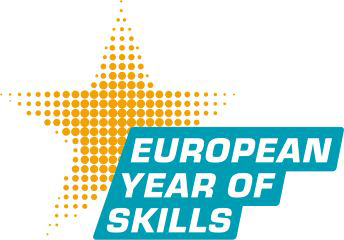

An initiative of the European Commission to boost training and upskilling
The European Year of Skills will give a fresh impetus to lifelong learning, empowering people and companies to contribute to the green and digital transitions, supporting innovation and competitiveness.
The European Year of Skills puts skills centre-stage. Helping people get the right skills for quality jobs and helping companies, in particular small and medium enterprises, address skills shortages in the EU is what this Year is all about.
The European Year of Skills starts on 9 May 2023, and will last 12 months, with numerous actions and initiatives that will be launched and promoted. Four main objectives are:
- promoting investment in training and upskilling
- ensuring that skills match the needs of employers
- matching people’s aspirations and skill sets with opportunities on the job market
- attracting people from outside the EU with the skills needed.
See also: European Year of Skills I europa.eu
The European Year of Skills in the Republic of Serbia, with regard to the main objectives:
1. Increasing and improving investment in skills: Implementation of measures of the active job search system (training for active job search, job search club, employment fairs, etc.) in order to acquire skills for active job search, presentation to the employer, etc. Implementation of measures from the system of additional education and training (professional practice, internship, training for the demands of the labour market, etc.) in order to acquire additional knowledge and skills with the aim of timely and efficient integration and reintegration into the labour market.
2. Making sure that skills are relevant: Implementation of the annual survey of employers' needs (one of the segments that are surveyed and analysed is related to existing skills and skills gaps for performing concrete jobs at concrete workplaces for the employers by their employees). Monitoring of meeting the employment needs submitted by employers to the National Employment Service.
3. Matching people’s aspirations with labour market needs: Further development of employability assessment methods and techniques (including the introduction of statistical profiling) for unemployed persons on the records of the National Employment Service. Further development of the system of career guidance and counselling and informing unemployed persons about employment opportunities according to the demands of the labour market.
4. Attracting talent with the right skills to Europe: Participation in various initiatives (especially regional ones such as the Youth Guarantee, etc.); Concluding bilateral agreements that enable and facilitate access to the labour market in the host country.
National goals: Identification of skills that are needed and missing in the national labour market in the field of digital skills and green economy and the development of training programs for acquiring these skills, with the aim of increasing the number of employees in these sectors.
See also:
Measures of active employment policy within the National Employment Service: https://www.nsz.gov.rs/
Publicly recognized organizers of adult education accredited by the Ministry of Education and Agency for Qualifications: https://prosveta.gov.rs/prosveta/srednje-obrazovanje/obrazovanje-odrasl…
Agency for Qualifications: https://azk.gov.rs/?page_id=75150#1595320793324-6e657bd0-c7e1
Ministry of Education: https://prosveta.gov.rs/
Tempus: https://tempus.ac.rs/foundation-tempus/